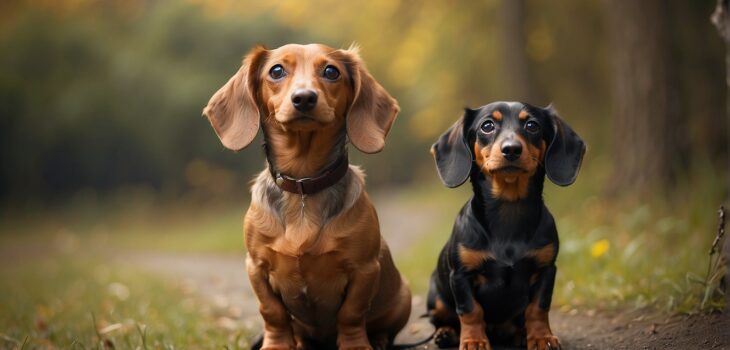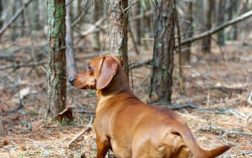Have you ever wondered about the distinction between a Dachshund and a Miniature Dachshund? These adorable and lovable dog breeds may seem quite similar at first glance, but there are actually some notable differences that set them apart. In this article, we will explore and shed light on the key characteristics that differentiate these two breeds, helping you gain a better understanding of their unique traits and decide which one might be the perfect furry companion for you. Whether you’re a dog enthusiast or considering bringing one of these delightful breeds into your home, this article aims to provide insight into the distinguishing features and qualities that make each of them special in their own way.
Physical Appearance
Size and Weight
When it comes to size and weight, the Dachshund and the Miniature Dachshund have noticeable differences. The standard Dachshund is larger and typically weighs between 16 and 32 pounds, while the Miniature Dachshund is smaller, weighing in between 8 and 11 pounds. These size variations mean that you have the option to choose a Dachshund that fits better with your living situation and lifestyle.
Body Proportions
Both the Dachshund and the Miniature Dachshund have long bodies and short legs, which are characteristic of the breed. This unique body shape is what makes them renowned for their ability to dig and fit into small spaces, like tunnels during their hunting days. This distinct physical characteristic is not only adorable but also serves a functional purpose.
Coat Type
When it comes to coat type, both Dachshunds and Miniature Dachshunds can have smooth, longhaired, or wirehaired coats. The smooth-coated variety is the most common and has a short, sleek coat that requires minimal grooming. Longhaired Dachshunds have longer, flowing fur, while wirehaired Dachshunds have a rough and wiry coat. It’s important to note that each coat type has its own unique grooming requirements.

Coat Colors
Dachshunds and Miniature Dachshunds come in a variety of coat colors, making them visually striking pets. Common coat colors include red, black and tan, silver dapple, chocolate, and cream. They can also come in combination patterns such as dapple, piebald, and brindle. The wide range of coat colors and patterns allow you to find a Dachshund that suits your personal preferences.
Temperament and Behavior
General Temperament
Dachshunds and Miniature Dachshunds are known for their lively and spirited personalities. They are generally loving and affectionate dogs that form strong bonds with their owners. Both breeds are also renowned for their alertness and can be excellent watchdogs. However, it’s important to note that individual temperaments can still vary, so it’s essential to spend time getting to know the specific dog you’re considering.
Energy Levels
In terms of energy levels, Dachshunds and Miniature Dachshunds are both energetic breeds, but the Miniature Dachshund may have slightly less stamina due to its smaller size. Regular exercise is vital for both breeds to prevent obesity and keep them mentally stimulated. Daily walks, interactive playtime, and mental challenges are all excellent ways to fulfill their exercise needs.
Trainability
Dachshunds and Miniature Dachshunds are intelligent breeds that can be somewhat stubborn. This can make training a bit challenging at times. Consistency, positive reinforcement, and patience are key when it comes to successfully training a Dachshund. Consider using reward-based training methods to keep them engaged and motivated. Early socialization and obedience training are critical to ensure a well-rounded and well-behaved dog.

Behavior with Children and Other Pets
Dachshunds and Miniature Dachshunds can be great family pets and generally get along well with children when properly socialized. However, these breeds may not be the best choice for families with very young children who may accidentally handle them roughly due to their small size. Additionally, they have a strong prey drive due to their hunting background, so caution should be exercised when introducing them to small pets like cats or rabbits.
Health
Common Health Issues
Like all dog breeds, Dachshunds and Miniature Dachshunds are prone to certain health issues. Some common health concerns associated with Dachshunds include intervertebral disc disease (IVDD), which can cause back problems, as well as obesity, dental diseases, and patellar luxation. It’s important to work with a reputable breeder and ensure regular veterinary care to minimize the risk of these potential health issues.
Lifespan
Dachshunds and Miniature Dachshunds generally have a similar lifespan, which ranges from 12 to 16 years. Proper nutrition, regular exercise, and routine veterinary care all contribute to their overall health and longevity. Providing a loving and caring environment can also enhance their quality of life and potentially extend their lifespan.
Exercise and Diet Needs
Both Dachshunds and Miniature Dachshunds have moderate exercise requirements. Daily walks, interactive play sessions, and mental stimulation are essential to keep them physically and mentally fit. It’s important to provide them with a balanced diet that meets their specific nutritional needs and avoids overfeeding, as obesity can lead to a range of health problems.
Grooming Needs
The grooming needs of Dachshunds and Miniature Dachshunds differ based on their coat types. Smooth-coated Dachshunds require minimal grooming, while longhaired Dachshunds and wirehaired Dachshunds need regular brushing to prevent tangles and matting. Additionally, regular nail trims, ear cleaning, and dental care are essential for maintaining good overall hygiene.
History and Origin
Dachshund
The Dachshund is a breed with a rich history that dates back to the 15th century in Germany. They were originally bred as scent hounds and were highly skilled in hunting badgers and other small game. Their name translates to “badger dog” in German, which perfectly reflects their primary purpose. Over time, Dachshunds gained popularity not only as hunting dogs but also as beloved companion pets due to their charming personality.
Miniature Dachshund
The Miniature Dachshund, as the name suggests, is a smaller version of the standard Dachshund. This variety was selectively bred to create a more compact dog that could better fit into smaller spaces during hunting expeditions. The Miniature Dachshund has become increasingly popular as a family pet due to its manageable size, playful nature, and adaptability to various living situations.
Breeding and Recognition
Both the Dachshund and the Miniature Dachshund are recognized by major kennel clubs and breed associations. The American Kennel Club (AKC) recognized the Dachshund in the early 1880s, and the breed quickly gained popularity. Likewise, the Miniature Dachshund also gained recognition and acceptance from kennel clubs worldwide, making it a well-established and cherished breed.
Purpose and Use
Hunting Background
The Dachshund’s hunting background is deeply embedded in its DNA. These dogs were originally bred for hunting small game, especially badgers. Their elongated bodies and short legs allowed them to maneuver through underground tunnels, locating and flushing out their prey. Despite their transition to companion pets, Dachshunds still possess strong hunting instincts, making them keen and alert in their surroundings.
Companion Dogs
Over the years, both Dachshunds and Miniature Dachshunds have transitioned into wonderful companion dogs. Their loving and affectionate nature, combined with their small size and adaptability to apartment living, make them a popular choice for many families. Dachshunds thrive on human companionship and are known for their loyalty and devotion to their owners.
Working Roles
While the primary role of Dachshunds and Miniature Dachshunds has shifted to that of companion pets, they can still excel in various working roles. Their intelligence, determination, and agility make them suitable candidates for activities such as obedience, tracking, and even therapy work. Dachshunds’ versatility enables them to showcase their skills in a wide range of settings and jobs.
Popularity and Demand
Overall Popularity
Dachshunds and Miniature Dachshunds consistently rank among the most popular dog breeds globally. With their charming appearance and endearing personalities, they capture the hearts of many dog lovers. Their popularity can be attributed to their adaptability to various lifestyles, whether in family homes, city apartments, or rural settings.
Demand for Different Varieties
While both Dachshunds and Miniature Dachshunds are highly sought after, the demand for specific coat types and colors can vary. Smooth-coated Dachshunds are the most prevalent variety, followed by longhaired and wirehaired. Coat colors and patterns also play a role in demand, with red and black-and-tan being the most common and desired by many.
Breed Availability
Due to their popularity, finding a Dachshund or Miniature Dachshund isn’t usually a challenge. Reputable breeders, rescue organizations, and breed-specific clubs can provide opportunities to bring one of these delightful dogs into your life. It’s essential to do your research and choose a reputable source to ensure you are getting a healthy and well-cared-for puppy or adult dog.
Training and Socialization
Training Methods
When training a Dachshund or Miniature Dachshund, positive reinforcement methods are generally the most effective. These breeds respond well to rewards, praise, and treats, making it easier to motivate and engage them. Consistency and patience are key, as their independent nature can sometimes lead to stubbornness. Avoid harsh training methods, as they can lead to fear or aggression.
Socialization Needs
Socialization is crucial for Dachshunds and Miniature Dachshunds to develop into well-rounded dogs. Exposing them to a variety of people, animals, and environments from a young age helps them learn appropriate behavior and become comfortable in different situations. Regular socialization helps prevent fear-based aggression and anxiety, making them more confident and adaptable companions.
Potential Challenges
While Dachshunds and Miniature Dachshunds have many wonderful qualities, they can present some challenges when it comes to training and socialization. Their strong prey drive may cause them to chase small animals or become territorial. Additionally, their independent nature can make them prone to stubbornness, requiring patience and consistency during training. Being aware of these challenges will help you navigate them successfully.
Choosing the Right Dachshund
Personal Preferences
When choosing between a Dachshund and a Miniature Dachshund, personal preferences play a significant role. Consider your affinity for a specific coat type or color and factor in your lifestyle and living situation. If you live in a smaller space, a Miniature Dachshund may be a better fit, while those with more room and a love for larger dogs may prefer the standard Dachshund.
Lifestyle Considerations
Your lifestyle and activity level should also be taken into account when choosing a Dachshund. Both breeds require exercise and mental stimulation, but the Miniature Dachshund may have slightly lower energy levels. If you are an active individual or family, the standard Dachshund may be better suited to join you on outdoor adventures. However, if you have a calmer lifestyle, the Miniature Dachshund may be a perfect fit.
Health and Genetic Factors
Consideration of health and genetic factors is crucial when selecting a Dachshund. Research potential health issues that may affect the breed and ensure you are acquiring a puppy from a reputable breeder who follows responsible breeding practices. Health clearances and genetic testing can help minimize the risk of common hereditary diseases. By choosing a healthy puppy, you can increase the likelihood of a long and happy life with your new companion.
Costs and Expenses
Initial Purchase Cost
The cost of purchasing a Dachshund or Miniature Dachshund can vary based on factors such as pedigree, coat type, and breeder reputation. On average, the initial purchase cost can range from $800 to $2,500. Keep in mind that investing in a well-bred and healthy puppy is essential to avoid potential health issues down the line.
Maintenance Costs
Owning a Dachshund or Miniature Dachshund comes with certain maintenance costs. These include regular veterinary check-ups, vaccinations, and preventive medications. Additionally, grooming costs can vary depending on the coat type. Smooth-coated Dachshunds generally require minimal grooming, while longhaired and wirehaired Dachshunds may require more frequent grooming sessions.
Healthcare Expenses
As with any pet, healthcare expenses should be factored into your budget. Dachshunds and Miniature Dachshunds can be prone to certain health conditions that may require ongoing medical care. Expenses such as routine vaccinations, annual check-ups, dental care, and potential treatment for medical issues should be taken into consideration when planning for your pet’s healthcare needs.
Conclusion
Summary of Differences
In summary, Dachshunds and Miniature Dachshunds share many similarities, but there are notable differences that can help you make an informed decision. The Dachshund is larger and may have slightly higher energy levels, while the Miniature Dachshund is smaller and more suitable for those seeking a compact companion. They both have charming and affectionate personalities, but training and socialization may present some challenges due to their independent nature.
Making an Informed Decision
Choosing the right Dachshund for you involves considering factors such as personal preferences, lifestyle, and health considerations. Whether you opt for a standard Dachshund or a Miniature Dachshund, you will be rewarded with a loyal and loving companion. Research reputable breeders, take the time to socialize and train your new pup properly, and provide them with the care and attention they deserve. With the right knowledge and understanding, you can make a well-informed decision and enjoy the joys of owning a Dachshund or Miniature Dachshund for years to come.




